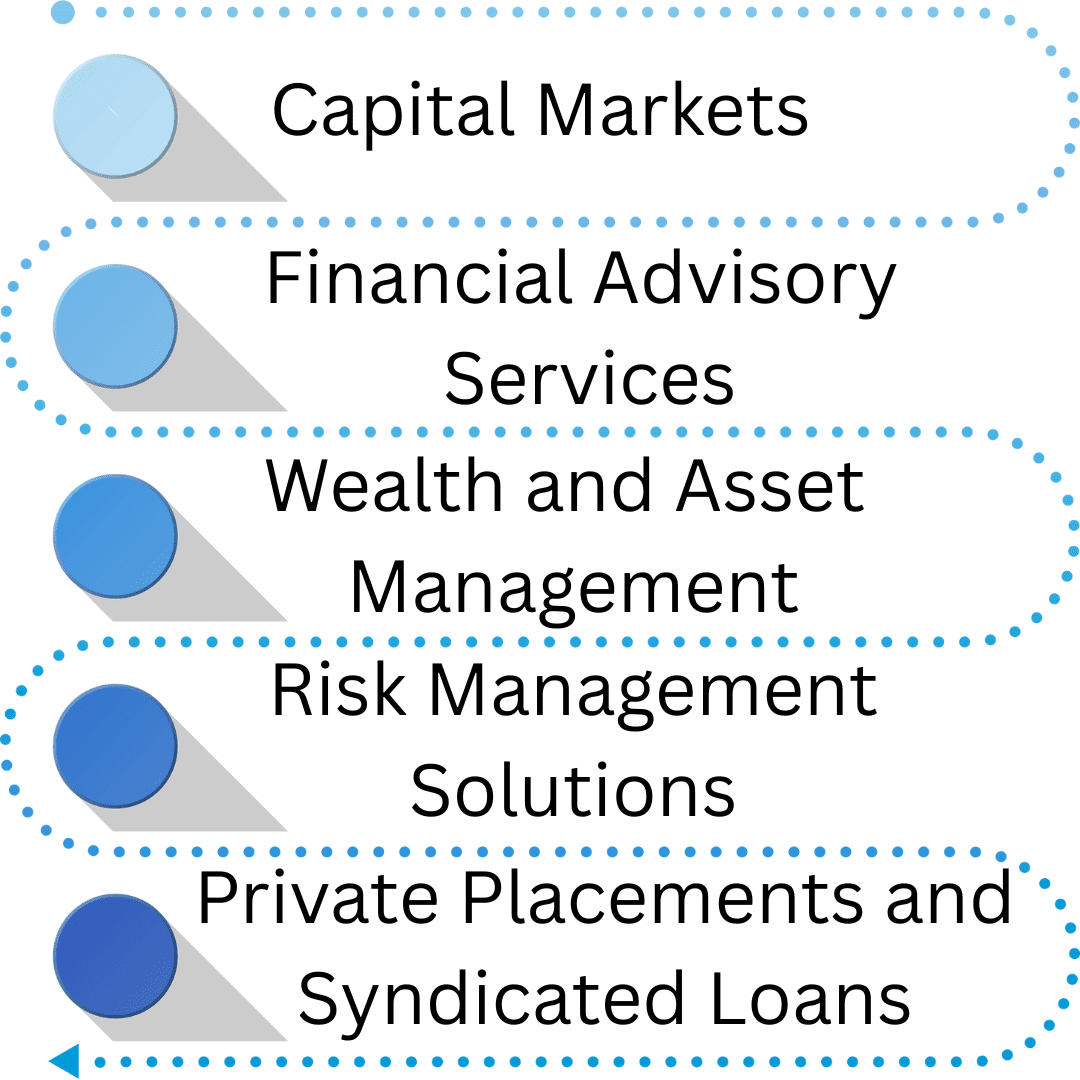- About us
- Outsourcing
- Strategic Finance
- Compliance & Tax
- Automation
- Group Companies
- Resources
- Career

In today’s fast-moving global economy, every organization whether a multinational corporation, a government body, or a growing enterprise faces complex financial challenges. From raising capital and expanding internationally to managing risks and complying with regulations, the right financial guidance can make the difference between success and stagnation. This is where investment banking comes in. Unlike traditional banking, which focuses on savings, deposits, and loans, investment banking is about strategy helping businesses unlock growth opportunities, structure large transactions, and navigate global capital markets. By understanding the core functions, services, and evolving role of investment banks, leaders can make informed financial decisions that drive long-term progress.
Investment banking is a critical pillar of the global financial ecosystem, providing specialized services that help corporations, governments, and investors manage capital, execute strategic transactions, and navigate complex financial markets. Unlike retail banking, which primarily serves individuals and businesses with deposits and loans, investment banking focuses on raising capital, financial advisory, and facilitating mergers and acquisitions.

Investment banking remains indispensable for organizations seeking financial growth and strategic guidance. Its core functions capital markets, financial advisory, wealth management, and risk management form the backbone of modern corporate finance.
Investment banks are not just financial intermediaries; they are strategic partners that drive corporate growth. Their expertise allows companies to navigate complex financial decisions, unlock new capital, and execute transformative transactions.
Mergers and Acquisitions (M&A)
Mergers and acquisitions are among the most high-profile activities in investment banking. Investment banks provide strategic advisory services to identify opportunities, perform valuations, and manage negotiations. Whether it’s a horizontal merger between competitors or a vertical acquisition to expand supply chains, investment banks ensure that transactions are structured efficiently and aligned with long-term business goals.
Leveraged Buyouts (LBOs) and Financial Engineering
Leveraged buyouts involve acquiring a company using a significant amount of borrowed money. Investment banks structure LBOs to optimize capital efficiency while managing risks. They evaluate the target’s cash flows, debt capacity, and operational potential, ensuring the buyout generates attractive returns for investors.
Underwriting Services
Another critical function is underwriting services, where investment banks assume the risk of buying newly issued securities and reselling them to investors. Underwriting provides companies with access to capital while transferring certain market risks to the bank.
Global investment banking has evolved with technology and regulatory developments. Basel III norms, AI integration, and blockchain solutions are transforming the way banks operate. Regulatory compliance ensures stability and risk mitigation, while technological innovations enhance efficiency and transparency in trading, data analytics, and financial modeling.
Corporate Restructuring
Corporate restructuring is a vital tool for companies facing financial challenges or seeking strategic realignment. Investment banks guide organizations through debt refinancing, divestitures, and operational restructuring, helping maintain market confidence and operational stability.
Investment banks contribute to corporate growth by combining advisory expertise, capital-raising capabilities, and risk management solutions. They are partners that help organizations achieve both financial stability and strategic advancement.

Investment banks are often misunderstood, but their influence on global finance is profound. They do much more than just facilitate transactions they act as strategic advisors, risk managers, and capital-raising specialists. Understanding the specific functions of investment banks provides insight into why corporations, governments, and high-net-worth individuals rely on them.
At their core, investment banks provide financial advisory, capital markets access, and risk management solutions to clients. Their main activities include:
Investment bankers are the professionals who execute the strategies and transactions that define investment banking. Their roles are diverse, encompassing advisory, analytical, and relationship-building responsibilities:
One of the most visible functions of investment banks is IPO underwriting. When a company decides to go public, investment banks act as intermediaries between the company and investors. Their responsibilities include:
By managing IPOs effectively, investment banks help companies raise capital, enhance their visibility, and enter public markets with confidence.
The investment banking landscape has been significantly reshaped by technology. Digital tools, artificial intelligence, and blockchain are redefining how banks operate, enhancing efficiency, and providing better insights for decision-making.
Algorithmic Trading Systems
Algorithmic trading systems use computer algorithms to execute trades at optimal prices and speeds. Investment banks leverage these systems to manage large volumes of trades, reduce human error, and improve execution efficiency. Algorithmic trading also enables complex strategies like high-frequency trading, statistical arbitrage, and trend analysis.
Blockchain for Capital Markets
Blockchain technology provides transparency, security, and efficiency in capital markets. Investment banks are adopting blockchain for clearing and settlement, trade finance, and digital asset issuance. This reduces operational risks, lowers costs, and accelerates transaction timelines.
Data Analytics in M&A
Advanced data analytics is transforming how investment banks approach mergers and acquisitions. By analyzing market trends, historical data, and financial metrics, banks can provide more accurate valuations, identify synergies, and mitigate risks in potential deals.
Digital IPO Roadshows
Investment banks are increasingly using digital IPO roadshows to reach a global investor base. These virtual presentations showcase company performance, growth prospects, and investment opportunities to potential shareholders, making the IPO process more efficient and inclusive.
Fintech Integration in Banking
Fintech integration allows investment banks to streamline operations, enhance client services, and deliver innovative financial products. From AI-driven risk assessment to automated reporting, fintech tools improve operational efficiency and client satisfaction.
Technology and innovation are driving a new era in investment banking. By embracing digital tools, algorithmic trading, blockchain, and fintech, investment banks are able to deliver smarter, faster, and more accurate financial solutions.
Investment banking operates in a highly regulated environment. Compliance, ethical standards, and risk management are essential to maintaining market integrity and protecting investors.
Regulatory Compliance
Investment banks must adhere to SEC regulations, Basel III norms, and other local and international financial rules. Compliance ensures that banks operate safely, protect investors, and avoid legal or financial penalties. Anti-money laundering compliance is also critical to prevent illicit financial activities and maintain the integrity of capital markets.
Global Investment Strategies
Cross-border transactions are increasingly common as companies expand internationally. Investment banks advise on regulatory differences, currency risks, taxation, and strategic implications. They also facilitate international syndications, private placements, and global capital market access.
Risk Management in Modern Banking
Modern investment banks provide sophisticated risk management solutions to hedge market, credit, and operational risks. Tools such as derivatives, insurance-linked products, and scenario analysis help organizations prepare for uncertainties while optimizing returns.
Looking ahead, investment banking will continue to evolve with digital transformation, ESG (environmental, social, governance) considerations, and data-driven decision-making. Banks will increasingly rely on AI, blockchain, and predictive analytics to offer strategic solutions that meet the growing complexity of global markets.
Investment banking is at the intersection of finance, strategy, and technology. By combining regulatory compliance, innovative tools, and global expertise, investment banks empower businesses to achieve sustainable growth.
Subscribe to our newsletter and stay updated.